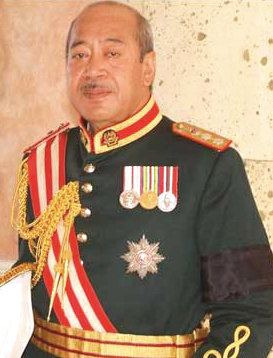
King George Tupou V
NUKU’ALOFA, Tonga (AP) — The impoverished South Pacific island nation of Tonga should move quickly toward nuclear power as its main source of electricity, its king said on June 11.
Opening the nation’s Parliament, King George Tupou V said while energy-hungry Tonga is planning to produce half of its electricity from renewable energy within three years, “nature is dictating that we must look to nuclear energy.”
He did not indicate how the near-bankrupt nation would fund a nuclear power plant, and New Zealand-based independent energy analyst Molly Melhuish questioned its viability.
King George said his government is following a U.S. plan aimed at developing small 30-megawatt nuclear plants to curb electricity costs and reduce dependence on expensive imported fuels.
“Should this development prove successful, it would be of enormous value in protecting our environment and reducing our use of diesel fuel,” he told the lawmakers.
Melhuish said with no small nuclear plants yet developed, it was likely that Tonga could be used as an experimental site. Any such plant “cannot be relevant to a poor island state,” she said.
A small nuclear reactor “would certainly be derived from a [nuclear powered] ship reactor,’’ Melhuish said. “It would not be a mainstream type [as] they’re not being developed yet — only talked about. I haven’t heard of one in the development or trial phase.”
“It’s outrageous to take a failed state and use it as a guinea pig’’ for an unproven scheme, she said. “That will mean [Tonga] will be indebted for the rest of time,” she told The Associated Press.
Late last year, officials produced a “Tonga Energy Road Map” that sets a goal of producing 50 percent of the country’s electricity from renewable energy sources, including solar and wind. Nuclear power was not part of their planning.
Currently, 95 percent of Tonga’s 20 to 30 megawatts of annual power consumption is produced by generators using high-cost diesel fuel. Just 5 percent of the electricity is produced by small solar plants located on outer islands of the archipelago.
While no South Pacific states, including Australia and New Zealand, have nuclear power plants, King George noted that building a nuclear station in Tonga would also help solve its need for clean drinking water through desalination.
Tonga’s main water sources are underground and have been polluted in recent years by fertilizers and pesticides, he said.
“The government maintains that nuclear power is our best hope of resolving our water problem as we can produce abundant supplies through desalination very cheaply,” he said. “The quicker we move in this direction, the better.”
King George was widely known as a rich and eccentric playboy during the reign of his father, King Taufa’ahau Tupou IV, who died in September 2006.
He has since implemented democratic reforms in the near-feudal monarchy, with the country’s voters set to choose a new government in elections later this year.
However, Tonga faces mounting poverty and unemployment among its youth, and relies heavily on aid and money remitted by citizens living abroad. The World Bank has said 40 percent of the nation’s 101,000 people live near or below the poverty line. ♦



